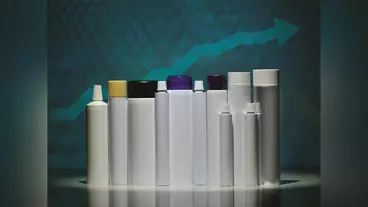Deliveries of aluminium tubes and aerosol cans stable

Deliveries of aluminium tubes and aerosol cans to the German market still developed satisfactorily in the first half of 2022.
In the case of aluminium tubes, demand from the pharmaceutical market in particular picked up again. As orders from the cosmetics and food sectors also developed positively, the market for aluminium tubes is stable overall at the previous year's level. Aluminium aerosol cans saw double-digit growth due to a significant increase in demand for deodorants and hair care products. However, overall volumes are still below the pre-Corona level. Overall, deodorants account for about 60 per cent of the total shipments of aluminium aerosol cans to Germany.
Deliveries to Germany still stable in the first half of 2022
Due to the inflation-related loss of purchasing power by consumers, who are reacting to the economically tense situation with more price awareness, demand is shifting from branded to private label products, especially in the food and cosmetics markets.
Dramatic situation on the gas market
In addition to the still difficult situation on the markets for transport services, which is putting the security of supply in the industry to a severe test, the developments on the energy and especially the gas market are causing great concern among the German manufacturers of aluminium packaging. The gas levy of 2.419 cents per kilowatt hour, which will take effect in Germany from October 2022 and distorts competition to the detriment of German manufacturers, is causing considerable additional burdens for domestic producers of aluminium packaging. "Competitive gas and electricity prices are essential for aluminium production and processing in Germany. Stretching out the gas levy over time and using the excess tax revenue that the state earns from high energy prices to provide corresponding relief for German industry could be suitable political countermeasures. An additional burden could arise from the gas consumption reduction of around 20 % planned by the German Federal Ministry of Economics and Climate Protection. This is because such a requirement is likely to lead to cost-intensive electrification measures or even cutbacks in production in the industry, which already saves energy where it can, as energy costs continue to rise. The current and possible future burdens make it more difficult to make investments in the future that will secure jobs and thus impair the innovative strength and competitiveness of the industry in the international environment," says Johannes Schick, Chairman of AD’s Division of Tubes, Cans and Impact Extruded Parts.
Uncertainty due to deteriorating consumer sentiment
The satisfactory order intake in the first half of 2022 has so far made the industry cautiously optimistic. This is due not least to the excellent recycling properties of aluminium as a material and recyclable material, which provides convincing answers to the sustainability requirements of politicians, customers and consumers. "However, if consumer sentiment and demand in the markets for fast-moving consumer goods deteriorate in the long term due to the difficult economic conditions, the situation could worsen in the course of the second half of the year," Schick sums up.

The demands for aluminium tubes and aerosol cans remained stable overall in 2023, despite the challenges the sector has to meet.

The members of Aerobal, the organization of aluminium aerosol can manufacturers, were able to improve the number of global deliveries by 6% to around 6.4b units in 2023.

The European market for aluminium and plastic tubes remained stable in 2023 despite adverse conditions.
